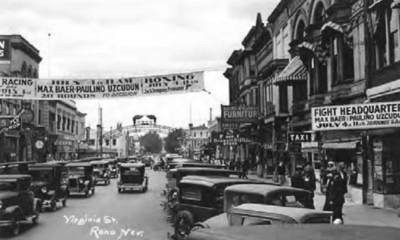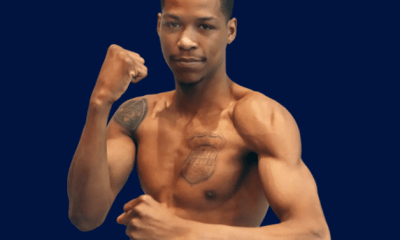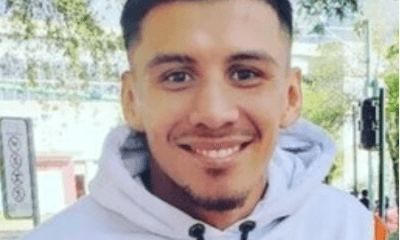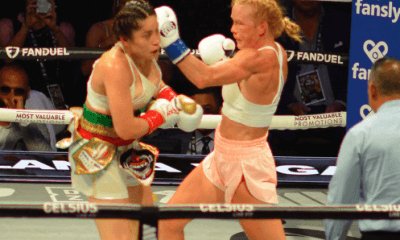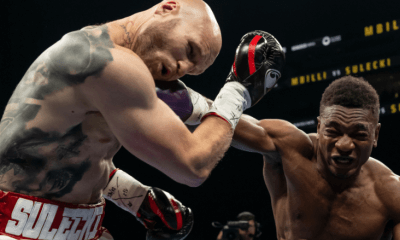Featured Articles
Should Russian Boxers Be Barred from Competing? Results of a New TSS Survey

The question this time was a somewhat complex one, to wit: “Do you believe that Russian (and Belarusian) boxers should be barred from competing until the conflict in Ukraine is over? If yes, why so? If not, why not?”
Twenty-seven notables in the boxing community weighed-in. The respondents are listed alphabetically.
Russ Anber — elite trainer, cornerman, and owner of Rival Boxing Equipment: In my opinion, yes! If you are a Russian or Belarussian boxer who’s home and legal status is still in Russia, then yes I think they should be barred from fighting. If you are Russian born, but you are now a legal, landed Immigrant or Permanent Resident in another country, then you are free to box. If you are Russian and travelling on a “Work Visa” and your place of residence and citizenship is still in Russia, then that would render you ineligible. As a side note I think this should be applied to all professional athletes including the NHL. If you are a Russian player playing on a Work Visa, then you lose that right.
Joe Bruno — member of Florida Boxing Hall of Fame, prolific writer, and former BWAA official: No Russian athlete should be allowed to compete anywhere while his country is killing innocent civilians in Ukraine.
Jeff Bumpus — former boxer, writer: I can understand both sides of the argument. I know that the 1980 (U.S. Olympic) team did not compete and the only ones who suffered were the athletes from both countries who were denied the stage (the Russians boycotted the ‘84 LA games). Holding the athletes out doesn’t solve the international crisis, but neither does ignoring a tyrant. The 1938 Olympics went forward despite Hitler’s aggressions. Were we wrong for sending Jesse Owens and the (others) to Germany? Or did any of it make any difference? I say no, it did not. And an athlete’s window of opportunity is very small. It’s a hard question to answer. If pressed, I say put the world affairs aside and let them compete.
Michael Culbert — former pro boxer: These boxers are just trying to make a living and have nothing to do with politics. It would be very unfair to be banned because of what their government has done.
Jill Diamond — WBC International Secretary: Sports should transcend politics; however, peace should transcend sports. We use the tools we have to accomplish this. It’s all terribly sad.
********** It’s Putin not them! **********
John DiSanto — keeper of Philly Boxing History, author: I believe they should NOT be barred from competing. The war in Ukraine was started by a corrupt leader and “government”, not the people of Russia. Although Russian athletes represent their country, they are not responsible for the problems. Although this might be reaching, a Russian boxer might even speak out against the aggression of his president, and thus help the overall cause of ending the war. So, no.
Rick Farris — president & founder at West Coast Boxing Hall of Fame: Who cares? Boxing is not important compared to what is going on in the world. I have never considered the best of Russia’s boxers to be competitive as professionals. And who cares about amateur boxing beyond those involved?
Jeffrey Freeman — aka KO Digest, TSS writer: I stand with conservative pundit Candace Owens on this one: “Absolutely appalling the way Russians are being treated in America and abroad. That our leaders and government institutions are allowing for and at times calling for this discrimination…..is quite telling. Russian lives matter.”
Clarence George — writer and historian: Of course Russian and Belarusian fighters shouldn’t be banned. We don’t punish people for their nationality. As Paul Sorvino said in Goodfellas (1990), “We’re not animali.”
Lee Groves — writer, author and the wizard of CompuBox: I understand the desire for administrators to demonstrate their outrage against Putin’s savagery, but I do not think penalizing Russians and Belarusians just for being born Russian or Belarusian is the proper way to do so. These athletes can’t control where they are born and they shouldn’t be prevented from making a living. If a specific athlete has been found to have supported or contributed to Putin’s carnage, that’s a different matter, but without that caveat, a ban is wholly unfair.
Henry Hascup — historian and President of the New Jersey Boxing Hall of Fame: No, Schmeling wasn’t banned back in the 30’s so why should they. It’s Putin, not them!
Chuck Hasson — author and historian: I really don’t think I am qualified to decide such a complex question. We have all tried to provide for our immediate families and these guys aren’t into political policy. They just want to take care of loved ones.
Arne Lang — TSS editor-in-chief, author, historian: I would prefer that this was handled on a case-by-case basis. For example, David Avanesyan is slated to fight this coming weekend in his adopted homeland of England and I am perfectly fine with it so long as Avanesyan doesn’t bring any Russian insignia into the ring with him.
Ron Lipton — member of NJ and NY Boxing Halls of Fame, referee, historian, writer: No. There are many people in Russia who are protesting the war. It should not be held against one fighter nor should the lone fact of their heritage be a reason to ban them from making a living. There was a guy in boxing once, let me think of his name, give me a moment please, he stood up against many for his beliefs, oh yeah, I remember, Muhammad Ali.
Paul Magno — writer, author, and boxing official in Mexico: Maybe I’m missing something, but I don’t see the direct correlation between an individual Russian athlete competing as a private citizen and the war in Ukraine as a whole. How would banning him/her impact Russia or strike any sort of blow to the Russian invasion? I guess there’s the propagandists’ use of a victorious Russian athlete to support their war efforts. There’s also the possibility that money earned from the event could be funneled into the war effort. So, maybe I’m wrong. But I just can’t get past the idea of shutting down a fighter’s livelihood for something that is 100% not their fault and something they actually may be against.
Adeyinka Makinde — UK barrister, author, contributor to the Cambridge Companion to Boxing: Politics should be kept strictly out of sports. Sporting links can maintain a vital link between nations which may be ruptured at diplomatic and trade level. All boycotts and barring edicts do is replicate national political rivalries and reveal the hypocrisy of those who have done the same or similar deeds of which they accuse the wrongdoing nation that is the target of the boycott.
Layla McCarter — world title holder, multiple weight divisions; member of Female Boxer Hall of Fame: It’s complicated. On the one hand stopping Russians from competing is meant to put pressure on Putin from his own people. On the other, the Russian people are paying the price for Putin’s actions. If they speak out against him, they are punished. By not allowing them to compete the world is punishing them. Fair? I don’t think so, so I lean toward letting them compete.
Robert Mladinich — former boxer, author, writer, actor: No fights should be sanctioned in Russia or for boxers based in Russia or Belarus but I don’t think it is fair to penalize boxers from those nations who are in other countries on work visas. It’s an emotional, hot button issue and I could entertain arguments for or against them being banned but it is important to strike a balance while still holding Russia accountable.
Joseph Pasquale — elite boxing judge and member of AC Boxing Hall of Fame: I imagine there will great difficulty just in obtaining visas to compete out of Russia under these war conditions. Compared to most sports, boxers have a very narrow window of peak career opportunity. This conflict will probably handicap many.
Russell Peltz — legendary Philadelphia boxing promoter, 2004 IBHOF inductee, author: I’m undecided. I hate to penalize any Russian athlete whose political leaning I have no clue about. On the other hand, it MAY be necessary to go all in 100% against everything Russian, whether it’s oil, vodka, McDonalds, athletes, etc
Dennis Rappaport — famous manager, promoter, and historian: Fights in Russia should not be sanctioned; however, you really should not prevent Russian fighters from boxing elsewhere. Even Schmeling wasn’t prevented from fighting in the U.S.
Fred Romano — boxing historian, author and former HBO Boxing consultant: This is not the type of question I would answer without careful consideration. I would like to know the precedents in such situations before drawing a conclusion. Punitive action against an individual for the actions of others must pass strict scrutiny.
Dana Rosenblatt — former middleweight champion of the world, inspirational speaker: The only way to make sanctions stick is if all Russians feel it. Then they will take action against their own government. All Russian boxers should be banned until the conflict is over.
Ted Sares — TSS writer: For sanctions to be 100% effective, they must be symbolic as well as actual. In my view, Russian boxers should be barred from competing in the U.S. until the conflict is over.
“Iceman” John Scully — former boxer, manager, trainer, writer: Of course not. They are not politicians. Many other countries do ungodly things to human beings including China and no one has ever called for them to be removed from any rankings. The fighter should not suffer. And the fact of the matter is millions of Russians do not agree with the invasion of the Ukraine. Ultimately people are trying to make the boxers victims as well.
Alan Swyer — filmmaker, writer, and producer of the acclaimed El Boxeo: Despite the Kremlin’s contention “that sport is beyond politics,” Russia has long used athletics as a tool for propaganda. That explains why systematic doping has resulted in 46 Olympic medals stripped from Russian athletes. Russian boxers should definitely be barred from competing not just until the conflict is over, but until Russian aggression ceases.
Peter Wood — former boxer, writer. author, and artist: In 1980, I strongly disagreed with Jimmy Carter’s decision to boycott the Moscow Olympics–the boycott was in response to the Soviet Union’s invasion of Afghanistan. However, today, in 2022, the situation is much different. I strongly support barring Russian & Belarusian boxers from competition. McDonald’s, Netflix, Shell, Visa, Mastercard, Adidas, AT&T, and hundreds of other major companies agree with me–they have halted business with Putin. So should the boxing community.
Summary
Most respondents felt that the boxers should not be punished for the situation in Ukraine, but there were some strong feelings on the other side of the argument.
How do you see it?
Ted Sares is a member of Rings 4, 8 and 10. He is a retired competitive power lifter. He can be reached at tedsares@roadrunner.com
To comment on this story in the Fight Forum CLICK HERE
-

 Featured Articles3 weeks ago
Featured Articles3 weeks agoAvila Perspective, Chap. 330: Matchroom in New York plus the Latest on Canelo-Crawford
-

 Featured Articles2 weeks ago
Featured Articles2 weeks agoVito Mielnicki Jr Whitewashes Kamil Gardzielik Before the Home Folks in Newark
-

 Featured Articles4 weeks ago
Featured Articles4 weeks agoAvila Perspective, Chap 329: Pacquiao is Back, Fabio in England and More
-

 Featured Articles4 weeks ago
Featured Articles4 weeks agoOpetaia and Nakatani Crush Overmatched Foes, Capping Off a Wild Boxing Weekend
-

 Featured Articles3 weeks ago
Featured Articles3 weeks agoCatching Up with Clay Moyle Who Talks About His Massive Collection of Boxing Books
-

 Featured Articles4 weeks ago
Featured Articles4 weeks agoFabio Wardley Comes from Behind to KO Justis Huni
-

 Featured Articles1 week ago
Featured Articles1 week agoMore Medals for Hawaii’s Patricio Family at the USA Boxing Summer Festival
-

 Featured Articles4 weeks ago
Featured Articles4 weeks agoDelving into ‘Hoopla’ with Notes on Books by George Plimpton and Joyce Carol Oates

